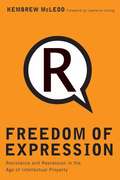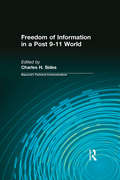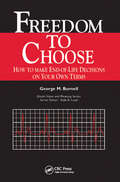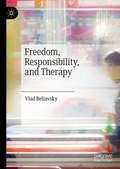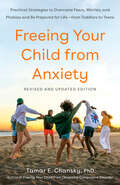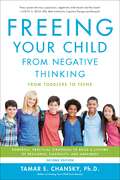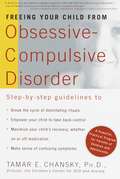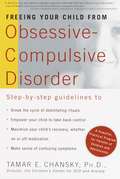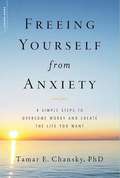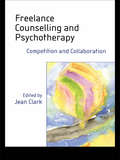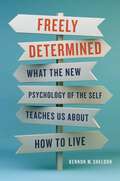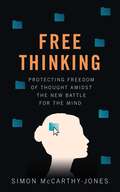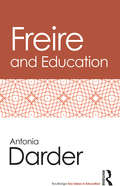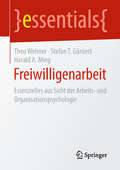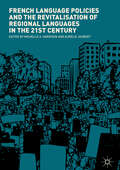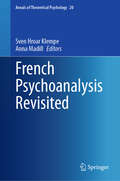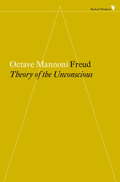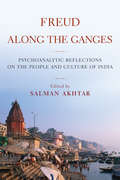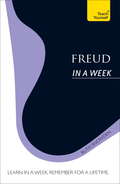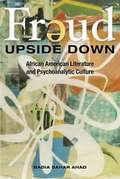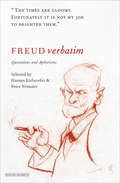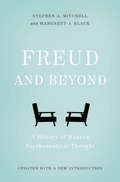- Table View
- List View
Freedom of Expression: Resistance and Repression in the Age of Intellectual Property
by Kembrew McleodThis is about the ways in which intellectual property laws have been used to privatize all forms of expression including the right of speech.
Freedom of Information in a Post 9-11 World (Baywood's Technical Communications)
by Charles H Sides"Freedom of Information in a Post 9-11 World" is, to date, the first international scholarly examination of the impact of the terrorist attack on the United States in terms of how it may alter academic and corporate research, as well as the sharing of information generated by that research, by international colleagues in technological fields. The collection of essays brings together a widely varied panel of communications experts from different backgrounds and cultures to focus their expertise on the ramifications of this world-changing event. Drawing upon the related but separate disciplines of law, interpersonal communication, semiotics, rhetoric, management, information sciences, and education, the collection adds new insight to the potential future challenges high-tech professionals and academics will face in a global community that now seems much less communal than it did prior to September 11, 2001.
Freedom to Choose: How to Make End-of-life Decisions on Your Own Terms
by Dale A. Lund Burnell M. Burnell"Freedom of Information in a Post 9-11 World" is, to date, the first international scholarly examination of the impact of the terrorist attack on the United States in terms of how it may alter academic and corporate research, as well as the sharing of information generated by that research, by international colleagues in technological fields. The collection of essays brings together a widely varied panel of communications experts from different backgrounds and cultures to focus their expertise on the ramifications of this world-changing event. Drawing upon the related but separate disciplines of law, interpersonal communication, semiotics, rhetoric, management, information sciences, and education, the collection adds new insight to the potential future challenges high-tech professionals and academics will face in a global community that now seems much less communal than it did prior to September 11, 2001.In "Freedom to Choose: How to Make End-of-Life Decisions on Your Own Terms", young persons, baby boomers, and "senior citizens" alike will find the information they need to make intelligent, informed, and well-planned decisions about end-of-life care, and to clearly state their wishes based on personal, cultural, religious, and family values. In direct and simple language, Dr. Burnell describes how to prepare for a smooth transition to end-of-life care and what to do to prevent family conflicts, overcome death fears and anxiety, and achieve peace of mind for our loved ones and ourselves.The book gives practical advice on how to make decisions about end-of-life care and how to prepare a living will and durable power of attorney for health care. Dr. Burnell provides guidelines at the end of each chapter on what to consider before preparing these important documents: how to preserve one's rights as a patient; how to choose the right doctor; the best place to be when critically ill; the laws governing advance directives; and the best alternatives for end-of-life care, such as good pain control and assisted dying (where this is legal). "Freedom to Choose" provides a user-friendly approach to facing these difficult decisions. It includes extensive lists of resources and organizations, and a glossary necessary for understanding the issues at hand. As this book makes clear, preparing an advance directive and knowing all the available options at the end of life are the most important steps for achieving peace of mind.The primary audience is anyone, young or old, who needs to prepare a set of advance directives: healthy people, for themselves or their loved ones who are seriously ill or on life support, and people with a terminal illness. The secondary audience is health professionals who deal with people in end-of-life care or with decision-makers on end-of-life issues: primary care physicians; nurses; geriatricians; psychiatrists; hospice doctors, nurses, and volunteer staff; caregivers for the seriously ill; oncologists; interns and residents; counselors; family therapists; psychologists; social workers who work with the dying and bereaved; attorneys; thanatologists; estate planning advisors; senior citizen center staff; college teachers in death and dying courses; professionals taking courses in psychology, gerontology, thanatology, nursing, and social work.
Freedom, Responsibility, and Therapy
by Vlad BeliavskyThis book investigates the role of free will and responsibility in mental well-being, psychotherapy, and personality theory. Mounting evidence suggests that a belief in free will is associated with positive outcomes for human mental health and behaviours, yet little is known about why the theme of freedom has such a significant impact. This book explores why and how different freedom-related concepts affect well-being and psychotherapy, such as autonomy, free will, negative freedom, the experience of freedom, blame, and responsibility.Through the lens of the works of Freud and Rogers, the book tackles both theoretical and practical questions: How can different senses of responsibility affect mental health? What are the implications of a lack of free will for therapy? If we have no free will, can therapists continue to encourage their clients to take responsibility for their actions? Is it possible to reconcile different counselling schools concerning free will? With an illuminating dive into both philosophy and psychotherapy, Beliavsky carefully analyses the implications of the philosophical free will debate on therapy and shows that some senses of freedom and responsibility are crucial to psychotherapy and mental health.
Freeing Your Child from Anxiety, Revised and Updated Edition
by Tamar ChanskyChildhood should be a happy, carefree time. Yet too many children are stressed-out and exhibiting symptoms of anxiety. In Freeing Your Child from Anxiety, childhood anxiety expert Dr. Tamar Chansky shares a proven approach for helping children build emotional resilience for a happier and healthier life.Parents everywhere want to know: What is normal? How can you know when stress has crossed over into a full-blown anxiety disorder? How can you prevent anxiety from taking root? And how do you help your son or daughter break free from a pattern of fear and worry and lead a happy, productive life? Fortunately, anxiety is very treatable, and parents can do a lot to help get their children's emotional well-being back on track.Freeing Your Child from Anxiety contains easy, fun, and effective tools for teaching children to outsmart their worries and take charge of their fears. This revised and updated edition also teaches how to prepare children to withstand the pressure in our competitive test-driven culture. Learn the tips, techniques, and exercises kids need to implement the book's advice right away, including "How to Talk to Your Child" sections and "Do It Today" activities at the end of each chapter. These simple solutions can help parents prevent their children from needlessly suffering today--and ensure that their children have the tools they need for a good life tomorrow.
Freeing Your Child from Negative Thinking: Powerful, Practical Strategies to Build a Lifetime of Resilience, Flexibility, and Happiness
by Tamar ChanskyFrom a leading clinical expert in the fields of child cognitive and behavior disorders, a new edition that addresses social media, bullying, suicide, and other challenges children and parents face todayIf unaddressed at the early stages, negative thinking can become the gateway to depression and more serious mental health issues. Habitual negative thinking creates chronic or occasional emotional hurdles and impedes optimism, flexibility, and happiness. Being constantly being overloaded with information from friends, classmates, teachers, parents, and the internet, children need tools and strategies for redirecting negative thoughts when they come. In Freeing Your Child from Negative Thinking, Dr. Chansky provides parents, caregivers, and clinicians with clear, concise, and compassionate guidance in equipping children and teens to overcome negativity. She thoroughly covers the underlying causes of children's negative attitudes and provides multiple strategies for managing negative thoughts, building optimism, and establishing emotional resilience.Now, in this revised and updated edition, Dr. Chansky addresses the complex challenges that come with raising kids in a digital age--from navigating social media use to cyber bullying, as well as the grim reality of increased school shootings and suicides. This new edition also includes an expanded section on depression, the importance of healthy sleep, and the parent's role in their children's digital lives. With practical tools for parents to guide their children through these challenges, Freeing Your Child from Negative Thinking is the handbook all parents need to help their children cultivate emotional resilience.
Freeing Your Child from Obsessive Compulsive Disorder: A Powerful, Practical Program for Parents of Children and Adolescents
by Tamar E. Chansky Ph.D.An empowering guide to helping children with OCD thrive and find relief from their most distressing symptoms, for kids as young as age four to teens &“Dr. Chansky has accomplished a tour de force, which is certain to offer much-needed assistance both to children with OCD-related problems and to their families.&”—Jeffrey M. Schwartz, MD, author of Brain Lock Parents of children with obsessive-compulsive disorder know firsthand how confusing and even frightening the symptoms of OCD can be. They have questions about how this condition works and how they can best help their kids: Which behaviors are part of ordinary childhood, and which are symptoms of OCD? How can they help their child take back control of their lives from disruptive thoughts and debilitating rituals? What should they do if their child experiences a relapse in symptoms? In Freeing Your Child from Obsessive-Compulsive Disorder, child psychologist and OCD expert Dr. Tamar E. Chansky helps parents make sense of a child&’s experience with this very confusing but highly treatable disorder. She shares intuitive, easy-to-implement strategies for helping kids and teens confidently outsmart the &“brain tricks and traps&” of OCD, alongside scripts for explaining symptoms to children of all ages and targeted advice for navigating a wide range of OCD themes. Dr. Chansky also advises parents on how they can tailor treatment to their child&’s needs with fully updated information on diagnostic criteria, medication, effective therapy modalities, and treatment outcomes, as well as the most recent findings on PANS and PANDAS, the sudden appearance of OCD symptoms after a strep or viral infection. With its research-backed and reassuring guidance, Freeing Your Child from Obsessive-Compulsive Disorder spells out exactly what parents can say and do to help their children reclaim their lives.
Freeing Your Child from Obsessive-Compulsive Disorder: A Powerful, Practical Program for Parents of Children and Adolescents
by Tamar E. ChanskyIf you're a parent of one of the more than one million children in this country with obsessive-compulsive disorder, you know how confusing, even frightening, the symptoms of OCD can be. You're terrified of losing your child.
Freeing Yourself from Anxiety: 4 Simple Steps to Overcome Worry and Create the Life You Want
by Tamar E. ChanskyIs worry wearing you out? Whether it's losing sleep over a deadline, fretting about a relationship, or constantly thinking about what you "should have" done or said, anxiety makes life feel like a race from one overwhelming situation to the next. Freeing Yourself from Anxiety reveals the real secret to reducing stress: not positive thinking, but possible thinking. In this breakthrough guide, Dr. Tamar Chansky shows you dozens of simple yet powerful strategies you can use at any time to transform your anxious thoughts, conquer perfectionism and procrastination, and improve the way your brain reacts to stress, even without medication. For anyone suffering with an anxiety disorder or depression, or who simply wants to handle everyday challenges more optimally and successfully, Dr. Chansky's innovative program will help you breathe easier. Get ready to feel calm, confident, more like yourself again-and free to create the life you want.
Freelance Counselling and Psychotherapy: Competition and Collaboration
by Jean ClarkThere are far more qualified counsellors and therapists than there are salaried posts, so many recently qualified practitioners face the challenges of working freelance. Freelance Counselling and Psychotherapy is an excellent guide on surviving and flourishing in a highly challenging field. Written by practitioners with extensive experience of the practical and emotional aspects of working independently, it covers the range of issues and choices which confront newly qualified practitioners, for example:* Regulation, registration and accreditation* Supervision* Financial issues in freelance therapy* The dynamics of competition and collaborationThis highly readable book provides an 'insider's' view of the field, and will be essential reading for trainers, established practitioners and newly qualified therapists alike.
Freely Determined: What the New Psychology of the Self Teaches Us About How to Live
by Kennon M SheldonA renowned psychologist argues that free will is not only real but essential to our well-being It&’s become fashionable to argue that free will is a fiction: that we humans are in the thrall of animal urges and unconscious biases and only think that we are choosing freely. In Freely Determined, research psychologist Kennon Sheldon argues that this perception is not only wrong but also dangerous. Drawing on decades of his own groundbreaking empirical research into motivation and goal setting, Sheldon shows us that embracing the ability to choose our path in life makes us happier, healthier, and more fulfilled. He also shows that this insight can help us choose better goals—ones that are concordant with our values and that, critically, we&’re more likely to actually see through. Providing readers insight into how they can live a more self-directed, satisfying life, Freely Determined offers an essential guide for how we might recognize our freedom and use it wisely.
Freethinking: Protecting Freedom of Thought Amidst the New Battle for the Mind
by Simon McCarthy-JonesScientific advances and new technologies are letting others manipulate our minds more easily than ever before. Now, those tasked with protecting our minds are finally preparing to fight back. As we speak, the United Nations is seeking to pin down a concrete right to free thought and enshrine it in international law alongside life, education and protest. But what is thought? And what makes it free? And how can it best be protected? Freethinking explores what an effective right to freedom of thought would look like, and asks how we might build a culture of free thought, and whether that&’s even what we want. In an uncertain and rapidly evolving world, Freethinking shows that there are solutions to the forces buffeting our minds.
Freire and Education (Routledge Key Ideas in Education)
by Antonia DarderOne of the most influential educational philosophers of our times, Paulo Freire contributed to a revolutionary understanding of education as an empowering and democratizing force in the lives of the disenfranchised. In this deeply personal introduction to the man and his ideas, Antonia Darder reflects on how Freire’s work has illuminated her own life practices and thinking as an educator and activist. Including both personal memories and a never-before published, powerful dialogue with Freire himself, Darder offers a unique "analysis of solidarity," in mind and spirit. A heartfelt look at the ways Freire can still inspire a critically intellectual and socially democratic life, this book is certain to open up his theories in entirely new ways, both to those already familiar with his work and those coming to him for the first time.
Freiwilligenarbeit: Motivation, Gestaltung Und Organisation (essentials)
by Theo Wehner Stefan T. Güntert Harald A. MiegDie Autoren erörtern in diesem essential die wesentlichen Punkte für das Verständnis und die Organisation von Freiwilligenarbeit. Sie beschäftigen sich mit den folgenden Fragen: Wie können wir freiwillige Arbeit verstehen? Wie wesentlich ist es für diese Art von Arbeit, dass sie unbezahlt bleibt und von sogenannten Laien mit besonderer Motivlage ausgeführt wird? Was folgt daraus für das Zusammenspiel von Freiwilligenarbeit und der professionalisierten, bezahlten Erwerbsarbeit? Diese Fragen werden zunehmend gestellt, denn ohne die unbezahlten Tätigkeiten von Freiwilligen kann kein derzeitiges Gemeinwesen bestehen.
French Language Policies and the Revitalisation of Regional Languages in the 21st Century
by Michelle A. Harrison Aurélie JoubertThis edited volume presents an analysis of the evolution of French language policies and their impact on French regional languages and their communities. It gathers studies on language revitalisation from several territorial minority languages (Breton, Alsatian, Catalan, Occitan, Basque, Corsican, Francoprovençal, Picard, Reunionese) and evaluates the challenges and opportunities that they face in the 21st century. The chapters tackle different aspects of language endangerment and language planning and adopt varied theoretical and methodological approaches. The first section of the book reconsiders the difficulties in establishing linguistic boundaries and classification for some regional languages. The second section examines the important theme of the new generation of speakers with issues of transmission and identity formation and the changes they can bring to traditional communities. The third section highlights new developments in the context of new technologies and the heightened visibility of regional languages. Finally, the last section presents an overview of the contemporary situation of minority language revitalisation in France and synthesises the key trends identified in this volume: from the educational domain to the European Charter for Minority and Regional languages. This book will appeal to students and scholars of the sociology of language, sociolinguistics, language policy, minority languages and language endangerment.
French Psychoanalysis Revisited (Annals of Theoretical Psychology #20)
by Sven Hroar Klempe Anna MadillThis Volume of Annals of Theoretical Psychology highlights the fact that the flourishing aftermath of both Freud’s and Lacan’s ideas still exist. This is done in different ways. Some papers focus on rereading core texts of Freud and Lacan. Others apply Freud’s and Lacan’s principles in a new and contemporaneous actuality. Others again, transform and develop some of the core principles in psychoanalysis, whereas others discuss the scientific principles that lie behind psychoanalysis. This book will be important for scholars interested in psychoanalysis in general. The readers should be both clinicians and others interested in psychoanalysis all over the world.
Freud
by Jerome Neu¿Tiene aún Freud alguna actualidad? Este volumen parte de la premisa de que así es. Al enfocar la obra de Freud no sólo desde una perspectiva filosófica, sino también histórica, psicoanalítica, antropológica y sociológica, los autores ofrecen nuevas vías de análisis del pensamiento y los actos humanos. Los ensayos tienen en cuenta tanto en contexto de la obra freudiana como su estructura argumental para revelar cómo es posible dar sentido a toda una variedad de experiencias por lo general incomprendidas. En ellos se cubren los temas centrales del pensamiento de Freud, desde la sexualidad y la neurosis hasta la moralidad, el arte y la cultura. Los nuevos lectores y los no especialistas encontrarán en estas páginas la guía más accesible y adecuada. Para los especialistas y los estudiantes ya familiarizados con la obra de Freud, el libro ofrece un panorama de los desarrollos más recientes en la interpretación de su pensamiento.
Freud
by Octave MannoniOctave Mannoni worked in France, Madagascar, and Africa throughout the twentieth century to develop Lacanian psychoanalytic methods in the feld of ethnology. He is best known for his research on the psychic affects of colonization: domination of a mass by a minority, economic exploitation, paternalism, and racialism. Positioning his perspectives within the Freudian framework, Mannoni's book Freud: The Theory of the Unconscious is a well-crafted and concise introduction to the Austrian neurologist's life, work, and theories. The major part of this book consists of an intellectual biography of Freud that traces the various crucial Freudian concepts key to understanding his work. Along with an introduction, the book also provides a critical account of the various shortcomings in Freud's work.From the Trade Paperback edition.
Freud
by Élisabeth RoudinescoÉlisabeth Roudinesco's bold reinterpretation of Sigmund Freud is a biography for the twenty-first century--a sympathetic yet impartial appraisal of a genius admired but misunderstood in his time and ours. Alert to tensions in his character and thought, she views Freud less as a scientific thinker than as an interpreter of civilization and culture.
Freud Along the Ganges
by Salman AkhtarWinner of the 2006 Gradiva Award A collection of new and previously-published essays that sheds light on the intersections between psychoanalysis and Indic Studies. While Indian academics and clinicians have been familiar with psychoanalysis for many decades, they have kept this Western model of the mind separate from the spiritual and philosophical traditions of their own country. Freud Along the Ganges bridges this important lacuna in psychoanalytic and Indic studies by creating a new theoretical field where human motives are approached not only psychoanalytically but also from the perspective of the teachings of Buddha, Tagore, Ghandi, and Salman Rushdie. The authors of this collection show how the insights of these Indian masters give a new force to the Freudian discovery by providing a basis to better understand the social and psychological Indian makeup. The book begins by questioning the applicability of the psychoanalytic method to non-Western cultures. It then traces the history of the psychoanalytic movement in India from its onset while it emphasizes the intricate overlap between Indian existential and mystical traditions and psychoanalysis. Freud Along the Ganges offers a unique study of the ways that Indian thought and psychoanalysis illuminate and enrich each other.
Freud In A Week: Teach Yourself
by Ruth SnowdenLearn in a week, remember for a lifetime!In just one week, this accessible book will give you knowledge to last forever. End of chapter summaries and multiple choice questions are all designed to help you test your knowledge and gain confidence. So whether you are a student or you simply want to widen your knowledge, you will find this seven-day course a very memorable introduction.Sunday: Learn who Freud was and what he didMonday: Explore Freud's early work and the beginnings of his psychoanalytical ideasTuesday: Discover Freud's views on the interpretation of deams and on the importance of the unconsciousWednesday: Consider Freud's often-controversial sexual theoriesThursday: Understand Freud's views on the importance of childhood, and how adult identity is formedFriday: Learn about Freud's views on civilization, religion and societySaturday: Look at how psychoanalysis has developed since Freud's time and how it is used today.
Freud In A Week: Teach Yourself
by Ruth SnowdenLearn in a week, remember for a lifetime!In just one week, this accessible book will give you knowledge to last forever. End of chapter summaries and multiple choice questions are all designed to help you test your knowledge and gain confidence. So whether you are a student or you simply want to widen your knowledge, you will find this seven-day course a very memorable introduction.Sunday: Learn who Freud was and what he didMonday: Explore Freud's early work and the beginnings of his psychoanalytical ideasTuesday: Discover Freud's views on the interpretation of deams and on the importance of the unconsciousWednesday: Consider Freud's often-controversial sexual theoriesThursday: Understand Freud's views on the importance of childhood, and how adult identity is formedFriday: Learn about Freud's views on civilization, religion and societySaturday: Look at how psychoanalysis has developed since Freud's time and how it is used today.
Freud Upside Down
by Badia Sahar AhadThis thought-provoking cultural history explores how psychoanalytic theories shaped the works of important African American literary figures. Badia Sahar Ahad details how Nella Larsen, Richard Wright, Jean Toomer, Ralph Ellison, Adrienne Kennedy, and Danzy Senna employed psychoanalytic terms and conceptual models to challenge notions of race and racism in twentieth-century America. Freud Upside Down explores the relationship between these authors and intellectuals and the psychoanalytic movement emerging in the United States over the course of the twentieth century. Examining how psychoanalysis has functioned as a cultural phenomenon within African American literary intellectual communities since the 1920s, Ahad lays out the historiography of the intersections between African American literature and psychoanalysis and considers the creative approaches of African American writers to psychological thought in their work and their personal lives.
Freud Verbatim: Quotations and Aphorisms
by Sigmund FreudThe founder of psychoanalysis and one of the twentieth century&’s most influential thinkers, in his own words. Sigmund Freud is on the very short list of historical figures who have profoundly influenced—perhaps even revolutionized—the way we think and the way we see the world and ourselves. This book compiles quotes, maxims, observations, and witticisms from the founder of psychoanalysis and the popularizer of such terms as ego, superego, and id. Covering subjects ranging from politics and religion to love and sex, this collection assembles passages from Freud&’s major works, as well as making use of personal letters to his friends and family. Organized into ten thematic chapters, this thought-provoking compilation provides a representative look into all of Freud&’s work.
Freud and Beyond: A History of Modern Psychoanalytic Thought
by Stephen A. Mitchell Margaret J. BlackFreud's concepts have become a part of our psychological vocabulary: unconscious thoughts and feelings, conflict, the meaning of dreams, the sensuality of childhood. But psychoanalytic thinking has undergone an enormous expansion and transformation over the past fifty years. With Freud and Beyond, Stephen A. Mitchell and Margaret J. Black make contemporary psychoanalytic thinking-the body of work that has been done since Freud-available for the first time. Richly illustrated with case examples, this lively, jargon-free introduction makes modern psychoanalytic thought accessible at last.
